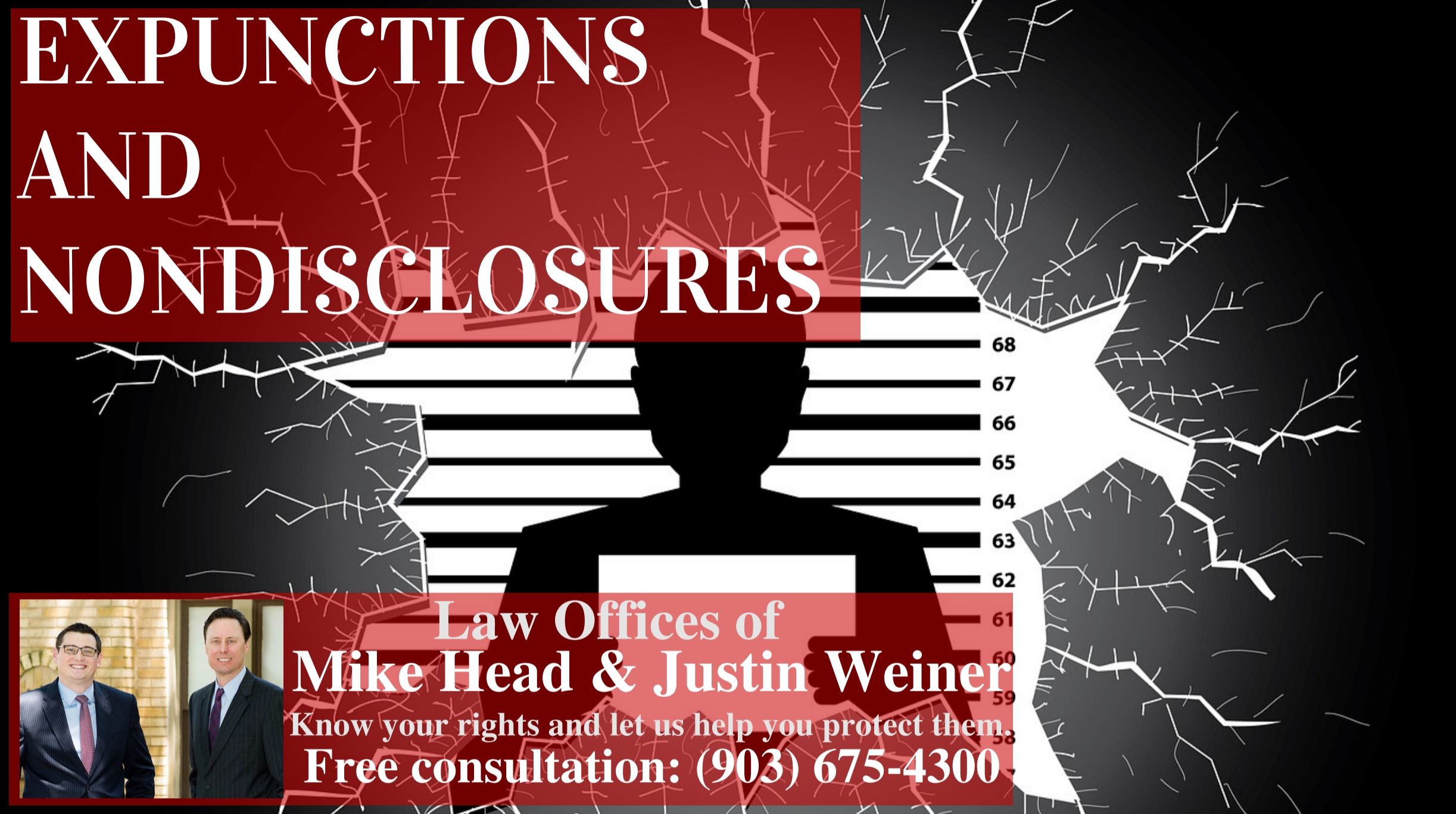Expunctions and Nondisclosures
 We all have made mistakes. Regardless of the circumstances, having an arrest, criminal prosecution, or charge on your record can anchor you down for the rest of your life. People that may access your criminal record include: future employers, landlords, insurance companies, state licensing boards, and even banks during financial transactions.
We all have made mistakes. Regardless of the circumstances, having an arrest, criminal prosecution, or charge on your record can anchor you down for the rest of your life. People that may access your criminal record include: future employers, landlords, insurance companies, state licensing boards, and even banks during financial transactions.
Even if you weren’t previously convicted, an arrest can greatly impact your future. However, there are potential legal means to address these issues before past accusations come back to haunt you.

An expunction in Texas is available only in very limited circumstances. An expunction isn’t a right, it is a privilege. Despite only being available in limited circumstances, if you are eligible and one is granted, it may be tremendously helpful to your future. An expunction under Texas law allows you to have information regarding an arrest or charge permanently removed from your record and permits you to deny it occurred.

-
An arrest for a crime that was never formally filed with a court.
-
A criminal charge that was ultimately dismissed.
-
If you were charged by acquitted by a jury or judge.
-
Certain qualifying misdemeanor juvenile offenses.
-
Conviction of a minor for certain alcohol offenses.
-
Conviction for Failure to Attend School.
-
Arrest, charge or conviction on a person’s record due to identity theft by another individual that was actually arrested, charged or convicted of the crime.
-
Conviction for a crime that was later pardoned by the Governor of Texas or the President of the United States.
Keep in mind that if you are convicted of an offense arising out of the same criminal episode for which you are acquitted of another, you are not entitled to an expunction.
-
For example, consider the following scenario: if you are arrested for Driving While Intoxicated but ultimately that charge was dismissed because of your plea to Obstructing the Highway stemming from the same arrest, the law does not allow you to have the arrest record for the Driving While Intoxicated to be expunged.
-
The same rule applies to you if are arrested for a Driving While Intoxicated and Possession of Marijuana at the same time. If the prosecutor dismissed the Marijuana charge because you take a Driving While Intoxicated conviction, that Marijuana charge cannot be expunged.

1. A document is filed with the court to request an expunction,
2. Filing fees must be paid unless filed within 30 days of an acquittal,
3. The document must supply the court with all information as to why someone is entitled to the expunction,
4. A proposed order is submitted for the Judge to sign if the expunction is granted,
5. Notice is provided to the appropriate state agency/agencies (local, state, and federal),
6. A hearing is conducted before the court to determine whether or not the expunction should be granted,
7. Agencies provided notice if the expunction is granted.

A nondisclosure is the procedure by which a person that has plead guilty or no-contest may have their records sealed. In essence, it is a court order prohibiting public entities such as courts and police departments from disclosing qualifying criminal records. Not all offenses are applicable. You must successfully complete a deferred adjudication probation before a petition can be granted by the court.
A nondisclosure, once granted, legally frees you from having to disclose or talk about a specific charge/arrest which even includes most job applications. Though each nondisclosure applies only to one charge, you can (if all legal requirements are met) obtain multiple nondisclosures.
This will not destroy all your records like an expunction. It merely restricts access to them and allows only criminal justice agencies, regulatory/licensing boards/agencies, and other agencies listed in Texas Government Code §411.081(i) to access the records.

1. You must be placed on and successfully complete deferred probation.
2. The offense must be one that qualifies for a non-disclosure. Many crimes of violence do not qualify.
3. You must wait a certain period of time after the completion of deferred adjudication probation to file for a nondisclosure.
5 years for felonies after the dismissal and discharge.
2 years for most misdemeanors after the dismissal and discharge
Some misdemeanors require no waiting period.
4. Finally, you must have not been convicted or placed on deferred adjudication for any criminal offense during the above reference time periods. This time period also includes the time period that you were actually on deferred probation.
Many times, measures can be taken to limit the exposure of past accusations. Don’t let your future be dictated by past accusations. Contact us today to see if we can help you.

The information presented is not legal advice and is not to be acted on as such. The information may not be current and is subject to change without notice. Interacting, commenting, or sending a message on this website does not create an attorney-client relationship.
 We all have made mistakes. Regardless of the circumstances, having an arrest, criminal prosecution, or charge on your record can anchor you down for the rest of your life. People that may access your criminal record include: future employers, landlords, insurance companies, state licensing boards, and even banks during financial transactions.
We all have made mistakes. Regardless of the circumstances, having an arrest, criminal prosecution, or charge on your record can anchor you down for the rest of your life. People that may access your criminal record include: future employers, landlords, insurance companies, state licensing boards, and even banks during financial transactions.





